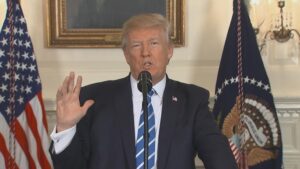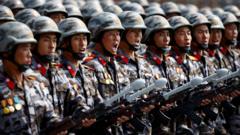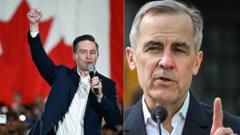Germany's Defense Minister Boris Pistorius advises Ukraine not to accept sweeping territorial concessions as part of a ceasefire agreement with Russia, labeling it as a capitulation. The debate escalates following a proposal from U.S. President Trump hinting at Ukraine relinquishing territory, including Crimea.
German Defense Minister Cautions Ukraine Against Major Territorial Concessions

German Defense Minister Cautions Ukraine Against Major Territorial Concessions
Concerns arise as U.S. President Trump's proposals suggest significant land give-ups by Ukraine in exchange for peace amid ongoing conflict with Russia.
Germany's Defense Minister Boris Pistorius has recently voiced strong opposition to any expectations that Ukraine might entertain significant territorial concessions in exchange for a ceasefire with Russia. Emphasizing the risks associated with such proposals, Pistorius cautioned that accepting these terms would equate to acquiescence on Ukraine's part. U.S. President Donald Trump, in recent statements, indicated that "most of the major points" regarding the peace deal are already agreed upon, allegedly entailing substantial land giveaways by Ukraine, including the contentious region of Crimea.
Ukrainian President Volodymyr Zelensky has consistently rejected the notion of ceding territory, emphasizing that such discussions should be reserved until a ceasefire is achieved. During an interview on Sunday with German public broadcaster ARD, Pistorius reiterated this sentiment, suggesting that while Ukraine might have to consider some concessions for the sake of peace, they should not yield to the latest American propositions which he claims mirrors capitulation.
Reports have surfaced indicating that the latest U.S. proposals, viewed by Reuters, appear to advocate for the acknowledgment of Russia's annexation of Crimea and tacit approval of Moscow's control over other occupied regions, including portions of Luhansk. In contrast, both Europe and Ukraine have countered these proposals, stating that matters of territory should only be discussed post-ceasefire.
Moreover, the U.S. offers blueprint plans for controlling the Zaporizhzhia nuclear facility, a site currently under Russian occupation, with the power distribution being split between Russia and Ukraine. In the backdrop of these discussions, Trump has positioned Ukraine's NATO aspirations as a trigger for the war, reinforcing his standpoint that Crimea will remain with Russia.
Secretary of State Marco Rubio also weighed in, urging a swift path toward a peace agreement between Russia and Ukraine. He remarked on the need for expediency to ensure that resources and time dedicated to these efforts yield tangible results soon. Following a productive meeting between Trump and Zelensky during the Pope's funeral in Vatican City, hopes remain for fruitful negotiations, but the road ahead appears complex as the stakes intensify with almost a fifth of Ukrainian territory currently under Russian control.



















